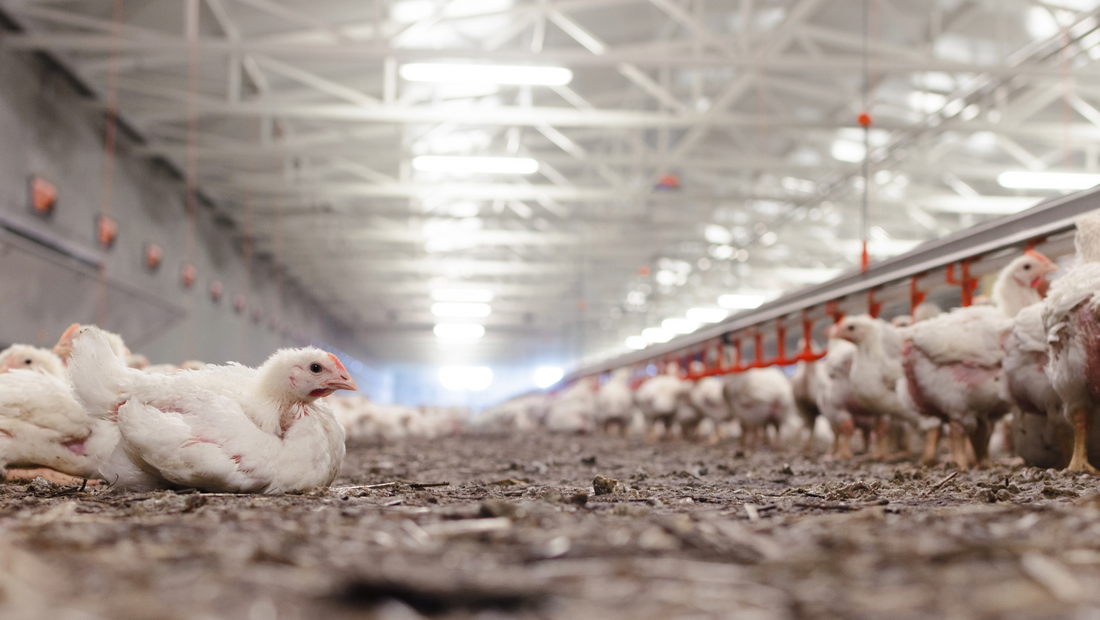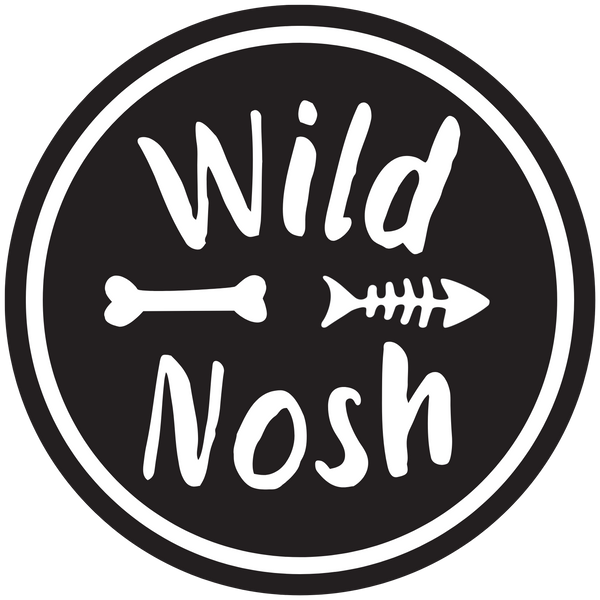
Committing to a Better Chicken
Chicken is the most consumed animal in the United States both by people and by pets, with more than 9 billion chickens raised for meat each year. It’s no surprise that when we first began experimenting with treats for Wild Nosh, chicken was one of the first proteins we used, or that our chicken crispers became our first successful signature treat. Initially, our goal was to make a treat that pets loved, and that was free of the common fillers, preservatives, and other artificial ingredients prevalent in so many pet treats.
From the beginning, we sourced human-grade chicken that was locally raised and touted labels such as “antibiotic-free” and “cage-free”. As we began to grow our line and dig deeper into animal welfare, we began to question these largely symbolic claims. One of our core values is to allow dogs and cats to thrive with biologically appropriate food and treats, and to encourage and engage their natural behaviors. Why would we support an industry that denies these basic freedoms to billions and billions of sentient beings? We decided then and there to find a better source of chicken. Despite the number of chickens raised in the United States, it quickly became apparent that finding chickens raised ethically, with animal welfare in mind, would be a tremendous challenge.
Unfortunately, this is in part by design. While the United States government has passed legislation prohibiting cruelty to animals and regulating methods of slaughter, poultry, such as chickens, have been completely excluded. Both the Animal Welfare Act and the Humane Methods of Slaughter Act specifically exclude poultry from regulation and protection. Another challenge is that almost all broiler (meat) chickens are Cornish-cross strains that have been selectively bred for decades to emphasize rapid growth and breast size above all else. This has had inherent negative implications on the quality of life of the birds themselves, with today’s commercial broilers suffering from such intense growth that they are unable to walk or perch like normal chickens, suffer from painful skin lesions, and between 50-400 million chickens die from cardiovascular distress each year. For a simple comparison, the red jungle fowl, from which all chickens are descended, spends 10% of their time resting. Today’s broilers spend up to 86% of their time resting because they are unable to carry their own weight.
Genetic concerns aside, chickens are housed in crowded “barns” alongside 20,000 other birds, with little to no enrichment, soiled bedding, and artificial lights that are only turned off for 4 hours each day to allow sleep. Chickens live 6 short weeks in these hellish conditions before they are transported to slaughter, another step in the process that has been modified to emphasize speed and efficiency. Most chickens in the US are slaughtered via water bath stunning, a process that involves 168 chickens being hung upside down by shackles on a moving processing line that passes them through electrified water, intended to stun them before their throats are cut by an automated blade. While fulfilling its ultimate goal of a fast and automated procedure, it’s rife with potential complications that cause severe and undue suffering for the chickens subjected to the process. The chickens are stressed while being shackled, flapping wings may hit the water resulting in electric shock, and if a chicken lifts its head they may miss being stunned altogether, resulting in them being scalded alive, a fate that met more than half a million birds in a 2016 study.
We began searching high and low for chickens that had lived a better life and been treated with respect. We stocked up on chicken feet from a small pasture-focused farm, bought hearts from retired laying hens, and contacted countless poultry operations to try to find a consistent source of ethically raised chicken. We’re excited to announce that we’ve finally found a reliable source of heritage breed, GAP Step 3 certified chickens that are given access to the outdoors and provided increased space and enrichment. Better yet, our supplier meets all of the requirements set forth by The Better Chicken Commitment (BCC).
The Better Chicken Commitment is a robust set of animal welfare standards that is based on over 150 scientific studies on broiler welfare. It covers breed, stocking density, litter, light, and enrichment, and addresses slaughter requirements, urging a multi-step controlled- atmosphere processing system that induces an irreversible stun. We’re committed to a world where chickens and all animals are treated with respect. We're happy to announce that 60% of our chicken products are fully compliant with the BCC standards, and 100% of our products meet the requirements for space, enrichment, litter quality, and lighting. By the end of 2024 we will require our chicken suppliers to meet the following requirements for 100% of our products:
- Maintain a maximum stocking density of 6.0 lbs./sq. foot and prohibit all forms of broiler cages.
- Provide all birds with an improved baseline environment[1], including:
- At least 3 inches of friable litter covering the whole floor of the house, managed to maintain dry, friable condition and prevent caked or wet areas.
- At minimum 8 hours of continuous light (≥50 lux) and 6 hours of continuous darkness daily (<1 lux).
- One or more types of functional enrichment (such as perches, platforms, or straw bales) that multiple birds can use at any time. The enrichments must be available by 10 days old and maintained thereafter, dispersed throughout the house, and available to the entire flock with 1 enrichment for every 1,000 sq. ft or 1 enrichment per 1000 birds, at a minimum.
- Process chickens in a manner that avoids pre-stun handling and instead utilizes a multi-step controlled-atmosphere processing system that induces an irreversible stun.
- Demonstrate compliance with all standards via third-party auditing and annual public reporting on progress toward this commitment.
- Use only BCC-approved breeds that demonstrate higher welfare outcomes.
“We are heartened by the effort put forth by Wild Nosh Pets to meaningfully and deeply address the plight of broiler chickens through policy and sourcing choices,” said Maral Cavner, Senior Manager of Corporate Policy, Farm Animal Welfare, at the ASPCA. “Pet food companies have an opportunity to raise the standards for farm animals and Wild Nosh is actively making progress to build a kinder and more environmentally sound supply chain. We are proud to recognize and support their effort through the ASPCA’s Higher Welfare Pet Food Initiative.”
